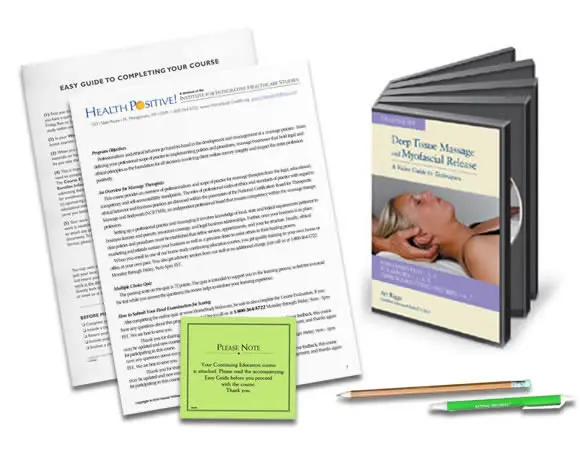Materials
- DVD Set - 11 hours
- Multiple-choice test
- Certificate upon completion
Description
Based on the popular 7-DVD set by Art Riggs, Certified Advanced Rolfer, CMT, this advanced practice home study course clearly demonstrates the principles necessary for deep tissue massage that's safe, sensitive and efficient.
This program also delves into the complex issues of soft tissue restrictions, osseous articulations and strategies for working with the multitude of different issues we face as therapists. This extensive training series not only shows countless strokes and techniques, but more importantly will demonstrate the qualitative art of working with deep tissues to effect profound change.
In this course, you will:
- define Deep Tissue Massage, identify its main principles and benefits and recognize at least 5 areas of caution
- differentiate between compressing tissue and stretching it; identify principles of correct biomechanics and recognize the key element of "melting" muscle tissue
- identify each of these stroke strategies, with examples of when their use is appropriate: lengthening, anchor and stretch, cross-fiber, separating muscle compartments, freeing entrapments and allowing muscles to shorten
- determine why it's important to place muscles in a stretched position and how to use side-lying positions
- identify specific therapeutic strategies for each of these areas: foot and lower leg, upper leg, pelvis, pelvis and low back, abdomen, upper and mid-back, shoulder girdle and chest, arms, hands and neck, skull and jaw
- learn how to instruct your clients about preventing back pain, neck pain and headaches, and recognize malignant melanoma
- identify therapeutic strategies for common complaints in each of the following areas and how to correctly apply it to practice situations: the ankle, plantar fasciaitis, the knee, tennis elbow, golfer's elbow, carpal tunnel syndrome, the low back, sciatica and the shoulder
- describe the key elements in assessing clients and choosing appropriate deep tissue approaches for them
- understand how to establish and maintain a thriving practice that includes Deep Tissue Massage and expresses who you are
Important - Completion of Part I of this program is highly recommended as a prerequesite to beginning Part II.
Course Objectives
- Define Deep Tissue Massage, identify its main principles and benefits, and recognize at least 5 areas of caution
- Differentiate between compressing tissue and stretching it; identify principles of correct biomechanics, and recognize the key element of “melting” muscle tissue
- Identify each of these stroke strategies, with examples of when their use is appropriate: lengthening, anchor and stretch, cross-fiber, separating muscle compartments, freeing entrapments and allowing muscles to shorten
- Identify why it’s important to place muscles in a stretched position and how to use side-lying positions
- Identify at least 3 specific therapeutic strategies for each of these areas: foot & lower leg, upper leg, pelvis, pelvis & low back, abdomen
- Identify at least 3 specific therapeutic strategies for each of these areas: breath, upper & mid-back, shoulder girdle & chest, arms, hands & neck, skull & jaw
- Identify at least 3 ways to instruct your clients about how to prevent back pain, neck pain and headaches, and at least 1 way to recognize malignant melanoma
- Identify at least 1 therapeutic strategy for common complaints in each of the following body parts, and how to correctly apply it to practice situations: the ankle, plantar fasciaitis, the knee, tennis elbow, golfer’s elbow
- Identify at least 1 therapeutic strategy for common complaints in each of the following body parts, and how to correctly apply it to practice situations: carpal tunnel syndrome, the low back, sciatica and the shoulder
- Identify the key elements in assessing clients and choosing appropriate deep tissue approaches for them
- Identify how to establish and maintain a thriving practice that includes Deep Tissue Massage and expresses who you are
Course Reviews
April Williams, LMT
4/4/2025
Sophia Lee, LMT, BCTMB
1/15/2023
Mark Leddy, LMT
6/14/2022
The course makes you think!
Lisa Marrone, LMT
2/19/2022
Daniel Koster, LMT, BCTMB
9/5/2021
Read more reviews
Instructors

Sharon Burch, MSN, RN, NCTMB
Sharon Burch holds a Masters Degree in Nursing and has been practicing as a nurse since 1974. She is currently a Registered Nurse in the state of Arkansas. Additionally, Ms. Burch studied under many of today's leaders in massage therapy and bodywork during the 1980s, became Nationally Certified through the NCBTMB in 1993 and holds a professional membership with the AMTA.
As founder of Health Positive!, Ms. Burch has created over 60 home study nursing and massage continuing education programs, performed over 65 public, live educational presentations, has written two published books, served as a member on the NCBTMB Continuing Education committee and was a founding member of the National Association of Nurse Massage Therapists.
Sharon is an instructor on many of the Institute's programs and has authored and co-authored various ethics courses and additional titles such as Touch for the Seriously Ill, Stress Reduction Through Bodywork, Staying Well – Naturally, Cardiopulmonary Health and Illness, Chronic Pain Management, Marketing Massage in Four Easy Steps, Preventing Medical Errors, HIV Update for Massage Therapists and Bodyworkers, Understanding HIV, Massage for Edema and more.
Back to Top



